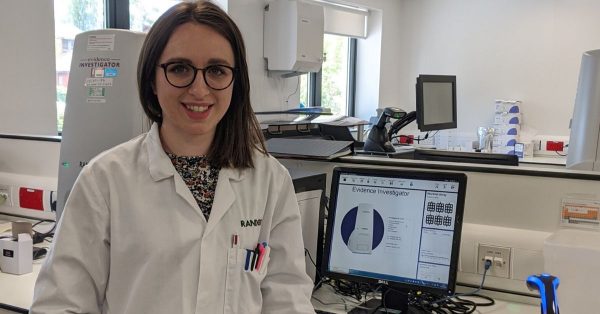Ciara Taylor talks to nijobfinder and discusses how she became a Clinical Immunoassay R&D Team Leader at Randox.
A quick summary of what that job entails
Our team works on the research and development of new clinical diagnostic tests for a variety of common health conditions, such as heart disease. We carefully design and execute laboratory experiments to ensure our tests perform at an exceptionally high level for hospitals and laboratories around the world.
What did you study and where?
I studied a four-year integrated Chemical Engineering Masters degree at Queen’s University Belfast. It was an ideal choice for me as it encompassed areas of the subjects I had enjoyed at school; Chemistry, Physics, Biology and Maths. I gained a lot of experience in research during my final year industrial project.
Give a brief outline of your career to date
I finished my university degree in 2016. I worked for an Engineering consultancy firm for 6 months, and then spent some time travelling before joining Randox in October 2017. In my first year I spent time learning about the science behind immunoassay development and how to apply to our research work. At the end of 2018, I was promoted to Research and Development (R&D) Team Leader, giving me more responsibility over the training of staff, and the progress of new projects, from initial concept and feasibility to product validation. I have also had the opportunity to travel and represent the company in conferences, events and career days.
Is this what you always wanted to do?
When I was younger I honestly had no idea what my ideal job would be. I simply knew that I wanted a dynamic role that involved working with people on challenging and interesting projects, which is exactly what I have here at Randox. I love the variety and opportunity that a global company like Randox offers as we are always trying to evolve and keep up with the latest industry demand. Currently every department is working together to process large-scale testing for COVID-19, as part of the government’s national testing programme.
Were there any particular essential qualifications or experience needed?
We have people of varying degree backgrounds in our team including Chemistry, Chemical Engineering, Biochemistry, Biomedical, Biological or Pharmaceutical Sciences. Experience in a similar R&D capacity is also helpful, though we offer full training to those who may have little experience specifically in diagnostics, but who possess a general science background.
Are there alternative routes into the job?
Whilst I joined Randox as a graduate R&D scientist following university, there are other routes available. Some of my colleagues began their careers by doing a placement year with Randox or by taking part in our Graduate Programme, in which graduates rotate across different areas of the business to find a job best suited to their skills and interests. Also available as an option is the Randox APEX scheme, which gives first year university students a summer and a third-year placement, and a job offer upon graduating. Naturally we also have a lot of PhD graduates join R&D, as they are ideal candidates for conducting research. Another route, if you don’t have the A-Levels for a university degree, is to go to a Technical College and gain an equivalent qualification in a science discipline. This could lead to a placement opportunity and later job with Randox.
What are the best and most challenging aspects of the job?
The best part of working in Randox is the people you work with. We work very collaboratively across different departments, and our staff come from a wide variety of backgrounds, so I am constantly learning from everyone around me and bouncing ideas off different people with different skillsets.
The most challenging aspect is the same in every R&D role – sometimes the initial feasibility experiments just don’t give the results you had expected. The rewarding part lies in solving the problem and making a breakthrough in your research project.
Why is what you do important?
The development of clinical diagnostic tests has a direct impact on the quality of healthcare that people receive around the world. It is rewarding to be part of a global company that is trying to improve people’s lives by providing a more personalised diagnosis using the tests we develop. As a company, Randox is continually investing money into the research of novel clinical biomarkers and testing platforms, showing its commitment to the improvement of diagnostics and ultimately, patient outcomes.
What advice would you give anyone looking to follow a similar career path?
If you are interested in R&D, keep your options and searches open. I didn’t know how much I would enjoy clinical R&D until I started at Randox. It makes a difference when you are genuinely interested and take pleasure in the work you do. Previous lab experience is ideal, so I would recommend trying to do a placement or getting some relevant work experience, especially if your degree doesn’t include much practical lab work.
If you weren’t working in Clinical Immunoassay R&D what would you like to do?
I would still love to be in a research role, perhaps in renewable or clean energy sources.
Describe your ideal day off
My ideal day off involves exercise or eating! I would go for a swim, yoga or a long walk, and then go out for dinner. I love trying new restaurants.
Did you know Randox is hiring?
Follow nijobfinder on Facebook and Twitter to see the latest jobs and to ensure you don’t miss out on your dream job.


